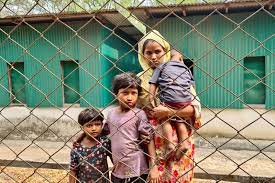Dr. Azeem Ibrahim
The refugee crisis in Bangladesh, caused by the genocide in Myanmar, has been acute for many years. Hundreds of thousands of displaced people, most of them with nothing but themselves, are confined to 34 refugee camps in Cox’s Bazar. They are poor, they are often hungry and malnourished, and crime and violent misery thrive among them. Most have been there for almost six years, since the 2017 expulsion of the Rohingya from their homes and villages in Rakhine State by the Myanmar military. Their problem is a long-standing one, complicated by the 2021 coup in Myanmar and the multifaceted civil war that has been fought there ever since.
Those in power in Myanmar now are the same military men who were the key architects of the Rohingya genocide. With no solution to their suffering at hand, the Rohingya must wait for more favorable political winds. But those are not what face them. Instead, things are becoming less favorable by the day. The government of Bangladesh is worried about the costs of the refugees and problems that surround the camps. They wish to be rid of the Rohingya as soon as possible.
Similarly, it seems, the UN is also losing patience with the refugee situation. At the same time as UN Special Envoy on Myanmar Noeleen Heyzer was last week giving a speech on the iniquities of the refugee crisis, in which she described the Rohingya as “persecuted and stateless, and (continuing) to suffer extreme hardship, living in difficult conditions and facing tremendous challenges,” an envoy of the Myanmar junta was in Bangladesh touring the camps. The military regime’s social welfare minister for Rakhine State, Aung Myo, traveled to Cox’s Bazar in order to vet Rohingya families so they could take part in a repatriation scheme of military design.
After years of limbo, the Rohingya refugees in Bangladesh might have hoped that their situation might improve and that they might one day be able to return to Myanmar, the country from which they were expelled. But this is not happening. Instead, those UN officers assigned to administer the Rohingya refugee crisis seem to be willing to work with the junta at exactly the time it presents the most danger to ethnic minorities and opposing political groups, as it is fighting a bloody and underreported civil war.
Internal messages sent by UN Resident Coordinator in Myanmar Ramanathan Balakrishnan, which were leaked to the Myanmar Accountability Project, indicate that not only did the UN allow the junta’s minister to visit the refugee camp, it also gave his delegation boats for the purpose with their UN markings removed. In the eyes of campaigners, this amounts to a tacit acceptance by the UN High Commissioner for Refugees of the plans the junta has for repatriating a minority that it has committed years of genocide against.
The UN may be tired of the Rohingya situation, which has never seemed further from a natural and satisfying solution, but cooperating with the junta is the wrong reaction to this problem. There is no refugee solution precisely because the junta remains in power, willing and able to commit more ethnic cleansing and racial violence using military force, backed by the regime. While the junta remains in power, the Rohingya can never be safe in Myanmar, which is why many of them fled and have not returned. For the UN to cooperate with the Myanmar military on refugee relocation schemes at the very time it is fighting a ruinous civil conflict is tantamount to endorsing the future good behavior of those who have already committed genocide.
The situation is unsatisfactory for all concerned. Bangladesh has difficulty bearing the financial and social cost of hosting so many refugees. The UN programs are perpetually under strain. As I have discussed recently, the World Food Program is painfully aware of the halts in supply and the shortages, which cause the Rohingya to face hunger and hardship. But this does not mean that compromise must be made with the most violent actors in Myanmar – the very people who cannot be trusted to safeguard the Rohingya.
There is only one solution to the crisis that could prevent further atrocity and marginalization, and that is the pursuit of justice. In the International Court of Justice, a case against the Myanmar junta rumbles on. Slowly, it is gathering evidence and gathering pace. The supporters of this process know it will be slow going, and difficult, to hold the military to account. But this must be done. Only when the legal work is justly concluded can the Rohingya be sure that the world will truly acknowledge what has been done to them, and commit to preventing more genocidal acts from being committed. Without justice, there can be no peace, and with no peace, there can be no repatriation for the Rohingya.







